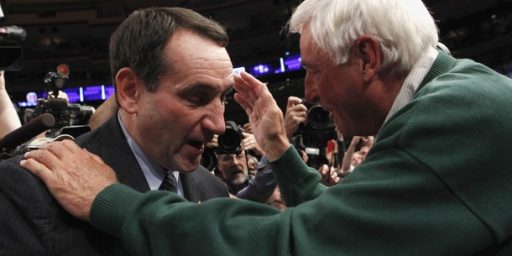No Titles of Nobility
Somehow a fundamental basis of the US Constitution (Art I, Sect 9) is being ignored by a US Congressman. That is OK, he is now a knight. A Knight of Lesotho.
Jim McDermott, congressman and doctor, has added another title: knight.
McDermott, D-Wash., was knighted by the king of Lesotho during an Aug. 22 ceremony at the Royal Palace in Maseru, his office said Friday.
“His Majesty Letsie III, by the Grace of God, Sovereign of the Kingdom of Lesotho, is pleased by these presents to appoint Jim McDermott Knight Commander of The Most Dignified Order of Moshoeshoe,” the official citation reads.
According to Lesotho officials, Most Dignified Order of Moshoeshoe recognizes distinguished leadership, particularly in the political sphere.
Noted. I guess he is renouncing his Congressional seat in order to become a Knight of Lesotho. He did swear to support and defend the Constitution of the United States of America, not Lesotho.






Well, at least in the UK a knighthood is definitely NOT a title of nobility.
Though it might be argued as being a “Title, of any kind whatever”; but there might be counter arguments that a knighthood is not a grant of an title but rather a recognition of honourable status.
Field day for the lawyers?
(“Paging Rouge Dragon Pursuivant of Arms in Ordinary…”)
Is this in honour of McDermott’s paid service to the realm?
Were it not for the day job, I’d have to research whether anyone’s ever been put out of office under clause 8. Never too late to start, of course.
http://en.wikipedia.org/wiki/Knight
Lethoso is a member of the Commonwealth, and so it should be assumed that their definition of “knighthood” is the same.
According to McDermott’s website, he was unaware that he would be knighted on this visit.
There is the provision for accepting the title “with the consent of congress”. Given the letter after his name, I suspect that if this becomes an issue we will see the democrats ram this through. Of course, it would be interesting to see them get it through the senate.
If Michael is correct that he didn’t know it was going to happen, I can actually feel sorry for him. You take a junket at taxpayers expense to another country, they throw you a great party and then when you have had a few of the local adult beverages, they offer to knight you. How do you decline without insulting your host?
YAJ, it doesn’t always _have_ to be adversarial. Honorary knighthoods are given out quite frequently. Alan Greenspan got one in 2002, and even Gen Schwarzkopf got one in ’91 for his work in Desert Storm, and that didn’t cause a crisis:
And don’t forget that Reagan was knighted as well: The Knight Grand Cross of the Order of Bath.
Just a couple of points: The UK gives honorary knighthoods to Americans. That means it has no significance whatsoever, beyond a neat thing to put on a business card.
Same regs pertain to foreign military and civil honors. If it’s for real, then it needs approval either from the Secretary of Whatever, or more generally the Congress. My father got several medals from the Vietnamese government that he could never wear because Congress didn’t approve an exception.
Slow news day, huh?
“…the UK gives honorary knighthoods to Americans.”
Yes, but that’s actually rather amusing to Brits, because all knighthoods are honourary anyway; the appointments are actually made via the Honours List.
Ennoblement is a different matter: that carries a title e.g. Lord Whatever (or Whatever of Wherever) and makes the recipient a peer of the realm.
Knighthoods don’t entail a title, or make one a peer, and aren’t hereditary.
( Though funnily enough, baronetcies which are sort-of ennoblements that are not peerages, but are hereditary, and carry automatically make the inheritor a “Sir” have IIRC been used more often recently than hereditary peerages, whereas most peerages lately are non-heritable…)
History geeking moment:
Baronetcies were actually invented by James I in the early 17th c. as an inheritable knighthood, and specifically to make money.
In a desperate attempt to make this relevant to the topic, I invite you to compare this concept to modern GOP fundraising. There will be a quiz on Tuesday.